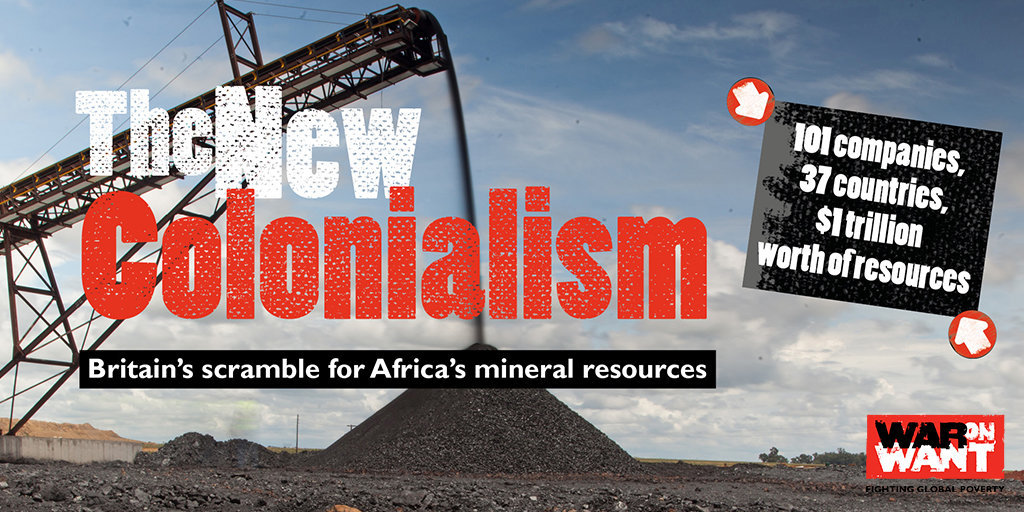
 |
||||
|---|---|---|---|---|
| Volume 46 Number 20, August 29, 2016 | ARCHIVE | HOME | JBCENTRE | SUBSCRIBE |
Part One: The New Colonialism

A recently published War on Want report entitled "The New Colonialism" highlights the extent of British monopoly control of Africa's major resources. According to the report 101 monopolies listed on the London Stock Exchange, most of them British, control more than $1.5 trillion worth of oil, gas, gold, platinum and diamonds in 37 African countries. The report concludes that successive British governments have used their "power and influence to ensure that British mining companies have access to Africa's raw materials. This was the case during the colonial period and is still the case today." This has been facilitated both through government trade and investment policies and the close relationship that exists between the British state and the monopolies. In many cases government officials and ministers leave office in order to join the boards of the major monopolies. Nearly a quarter of the monopolies are based in British tax havens in the Channel Islands or the Caribbean.
The report shows that many of these monopolies dominate entire African economies, for example Shell dominates Nigeria's oil industry, Genel Energy is attempting to dominate the oil industry in Somaliland, Acacia Mining, a British segment of the Canadian monopoly Barrick Gold, which dominates the gold industry in Tanzania, Anglo-American and Petra Diamonds control much of Africa's diamond industry in South Africa, Namibia, Tanzania and Botswana. Anglo-American, Glencore and Sable Mining controls Africa coal extraction. African economies that are still largely reliant on the export of one or a few major raw materials, as Zambia is dependent on copper, are therefore dominated by British monopolies. The report highlights the fact that a monopoly such as Glencore, one of the world's largest mining companies with interests in Burkina Faso, Cameroon, Chad, Congo, DRC, Equatorial Guinea, Mauritania, Namibia, South Africa, Tanzania, and Zambia, has been able to amass revenue that is ten times the total GDP of Zambia.
The report points out that African governments still have little control over these resources or the monopolies that control them. These monopolies are not bound to purchase goods from the countries they exploit nor employ local workers. In many cases they avoid or evade taxation. In short Africa's resources are being plundered. So called "aid" is used as a subsidy for these monopolies but recent research shows that even the total of aid and other forms of direct investment in Africa is some $60 million less than profits extracted from the continent by the big monopolies.

In November 2013 for example, the British government announced a new mechanism for enabling access by British companies to African raw materials, to be facilitated by British aid. The so-called High Level Prosperity Partnerships (HLPP) involve the Foreign Office and the Department for International Development (DFID) supporting a range of major British oil and mining monopolies to find new areas for investment. Its focus is Angola, Côte d'Ivoire , Ghana, Mozambique and Tanzania. The report concludes that "there is little doubt that the major prize is access to oil and gas resources at a time when many African countries have recently made new finds and are giving massive contracts to foreign companies". Four of the five HLPP countries, Angola, Ghana, Mozambique and Tanzania, are developing new oil or gas fields. In Tanzania the government have been assisting the BG Group, which has $1 billion worth of investment in the country, especially in the gas sector, and was recently acquired by Shell. A former board member of the BG Group is also one of DFID's two Non-Executive Directors. Other former BG Group board members include: Baroness Sarah Hogg, former head of the Prime Minister's Policy Unit under John Major; Sir David Manning, a former Ambassador to Israel and the US; Sir John Grant, a former Foreign Office official and the UK's permanent representative to the European Union during 2003-7 who was BG Group's Executive Vice-President.
The War on Want report highlights the fact that in the context of the new scramble for Africa's resources British monopolies and the British government remain major players and therefore major enemies of the African people. The facts show that there can be no illusions about enslaving "aid" nor about the so-called DFID which is rather the opposite, a mechanism for under-development, dependency and exploitation in Africa and elsewhere, in the service of the big monopolies and financial institutions. The times cry out for an end to such intervention in Africa and for an end to monopoly right. It is therefore the responsibility of all who recognise this necessity to find the means to bring this about.
Link to Full Issue of Workers' Weekly Volume 46 Number 20, August 29, 2016